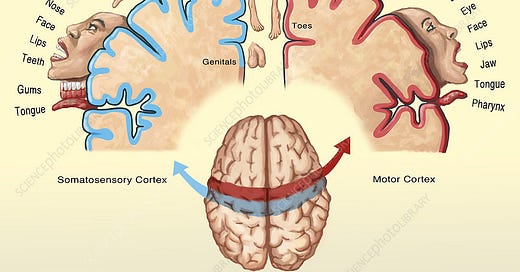The Civilizational Crisis: How the Reading Circuits in Our Brain are Disappearing
Introspection triggered by Erik Hoel with insights from Mariann Wolf, the author of two books on reading.
In a recent interview with me, the veteran Tunisian civic activist Messoud Romdhani remarked: If you have a society that does not think, it is useless. We were talking about the regression in people’s reading habits across the world with the advent of new media dominated by audio-visual content.
I think we can reframe that same idea like this: without effective and thoughtful reading, there is no civilized modern society.
I just had a rude awakening about the sorry status of reading in the society after reading a recent post in Erik Hoel’s newsletter titled ‘How to teach your two-year-old to read’. The subtitle was even more impressive: ‘More importantly, why to do it’.
I felt envy as well as a stinging pang of guilt watching the brief video in which his two-year-old son reads even a long sentence. My own son is three-and-a-half. He can read and write the English alphabets but no one has even taught him about word formation. Until now.
While the immediate emotions of guilt and envy were not particularly useful, that post also generated a far more constructive emotion inside me: sense of responsibilty and an urge to help my son catch up with the peers like Hoel’s son.
Before setting out to action, I revisited my own earlier works related to reading. I have one useful habit of talking about any good article/podcast/video that I come across with a decent audience in dozens that comes online every working day at 8 am Nepali time to listen to me (offline audience of the recorded room is in hundreds). It started as ‘NewsGuff’ (talking about the news) in Clubhouse and is now running in X (@jiwan_kshetry).
In two of the NewsGuff shows, I had talked about a podcast, an episode from the Ezra Klein Show in which Klein interviews the American scholar Mariann Wolf, the author of “Proust and the Squid: The Story and Science of the Reading Brain” and “Reader, Come Home: The Reading Brain in a Digital World”.
Nepali speakers among you can check the video version of my talk here and here. Here, though, I will briefly highlight Wolf’s insights from the podcast.
Do you know that the different parts of our body are represented in two parts of the brain controlling the sensory and motor functions like this:
This image shows a kind of permanent address of the brain areas controlling different parts of the body. The fun fact (according to Mariann Wolf): there is no such permanent address for reading. It is there for language, for vision and for hearing but not for reading.
The reason? Our ancestors managed their lives for hundreds of thousands of years without reading.
Now, reading is represented by circuits in various parts of brain that can be formed, reinforced and sustained with practice but they do not remain there just like a location in the map.
In other words: reading is always a work in progress. With no practice, regression is inevitable.
Even a PhD scholar, with enough of drowning in the AV materials and abstenance from real reading for years, can accomplish a total erasure of her reading capabilities. It may take decades of hard work to develop deep reading skills, but years of neglect can easily undo that achievement. Wolf herself has an illuminating anecdote about this.
My fear is, the entire population across countries is now going through this process. A mass disappearance of reading circuits in the human brains is sweeping societies, dumbing down the people who are seeing a parallel reinforcement of circuits of hedonism, polarization, retribution, bigotry and so on.
The result is a society full of acromony and hatred. Amid all this, though, people are far from realizing this seismic change in the society because skimming, scanning and scrolling (SSS) through the screens is giving them the illusion that they are still reading.
As Wolf aptly explains in the interview, we are bringing back that supefluous SSS reading skill even when we read a physical book now because our brains have been rewired so that we can skim, scan or scroll through a massive volume of text in limited time with little regard for the real message underneath the text.
Deep, thoughtful and meditative reading with the potential to transform ourselves into better human beings has meanwhile vanished from our day-to-day life. So have the circuits that once enabled it.
It is in this larger context, where even the teachers are unaware of such colossal collective degeneration of people’s reading abilities, that my son is growing up. What he will end up becoming or doing thirty years from now may largely be shaped by the quality of the reading skills that he develops now in his early years. The stakes cannot get any higher than this.
If Wolf’s insights were a set of instructions for good reading for every age group (she advocates for development of ‘biliterate brain’, a brain capable of both transformative reading and information gathering through screens), Hoel’s post was a warning bell for me as a father.
In fact, I have already started the work and in two days, my son is happily transitioning from an alphabet-kid to a word-kid. Soon he will be sentenced to literacy!
Let the early deserters go away. But if you came to this point, you probably value my work at this newsletter. Please be kind enough to leave some comment below and forward this email to a couple of your friends who may find this useful. Cheers!





Great wr;iting sir !! Loved it.